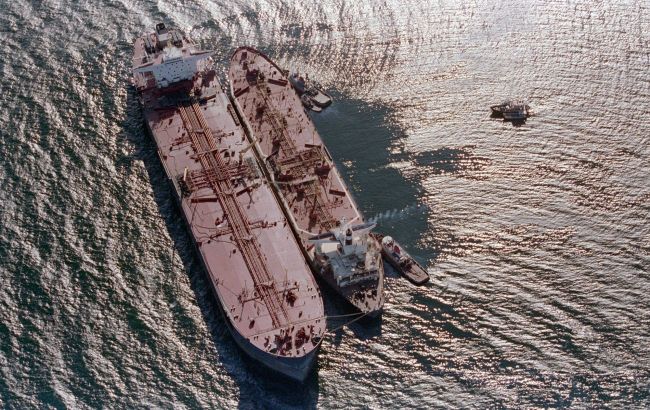Russia's shadow tanker fleet causing environmental damage - Reuters
 Photo: Russia's shadowy tanker fleet threatens the environment (Getty Images)
Photo: Russia's shadowy tanker fleet threatens the environment (Getty Images)
A growing shadowy fleet of tankers carrying sanctioned Iranian, Venezuelan, and Russian oil is filling up with the cheapest fuel available, hampering efforts to reduce emissions from shipping, according to Reuters.
Hundreds of tankers carrying sanctioned oil are a problem because they are difficult to track due to their opaque ownership and use of non-Western insurance and other maritime services, and they have little incentive to comply with cleaner shipping standards.
“You're seeing greater numbers of ships that have found ways to circumvent sanctions by operating outside Western jurisdiction. The dark fleet has gone on steroids. And the deceptive shipping practices that they're engaging in are getting more and more complex and sophisticated,” says Michelle Wiese Bockmann, chief analyst of maritime data group, Lloyd's List Intelligence.
These include unsafe ship-to-ship transfers of oil in international waters to avoid inspection by state port authorities, falsifying ship identification numbers, tankers sending out false information about their location, and using flag registries with lower standards of technical oversight and expertise. Bockman.
According to Lloyd's List Intelligence, the shadow fleet has grown to approximately 630 tankers from 530 last year, accounting for 14.5% of the total global tanker fleet. Some industry estimates put the number even higher at over 800 tankers.
These figures suggest further rapid expansion following Moscow's invasion of Ukraine in 2022 and Western restrictions on Russian energy exports, which have resulted in ships being sanctioned.
According to Lloyd's List Intelligence, the shadow tanker fleet numbered around 280-300 vessels before Russia's full-scale invasion of Ukraine.
This growth has raised concerns about its environmental impact and the safety and effectiveness of sanctions, including the Western ban on the supply and trade of Russian oil at a price above $60 per barrel.
Under the so-called IMO 2020 convention adopted by the International Maritime Organization (IMO), ships must switch to low-sulfur fuel from the high-sulfur diesel fuel that the industry has used for decades.
No cleaning
Enforcement of these emissions-reducing regulations is up to IMO member states, which can levy fines or hold ships in court for non-compliance. In April, the IMO called on its members to step up inspections of ships considered to be shadow courts and to increase fines for any violations. IMO rules state that ships can only burn high-sulfur fuels if they have exhaust gas cleaning systems known as scrubbers.
However, shadow fleet tankers can run on higher-sulfur diesel fuel, which is estimated to cost 20% less than cleaner fuel, without inspections unless they are stopped in ports to enforce the rules, people familiar with the matter said.
"A lot of shadow vessels have no scrubbers but they buy high sulphur fuel oil when they are in Russia," one industry source says. "So, they are breaching the IMO's sulphur limit."
It is difficult to estimate the level of non-compliance with IMO 2020 among the shadow fleet, but there has been an increase in the number of vessels detained for sulfur-related violations.
Port authorities in Europe and Asia detained at least ten ships in the first five months of 2024 in connection with the convention, compared to six in the same period last year and five in all of 2022. Of the ten tankers detained, nine had previously called on Russia.
Russia and its partners in the Eurasian Economic Union, which includes Kazakhstan, Kyrgyzstan, Armenia, and Belarus, agreed in December that they would continue to use high-sulfur fuels until the end of 2026. This means that ships can still receive high-sulfur fuel in ports serving these countries.
White House Deputy National Security Advisor for International Economics Daleep Singh said that the United States could take additional measures to increase the cost of Russia's use of the shadow fleet to evade the G7 oil price ceiling.

